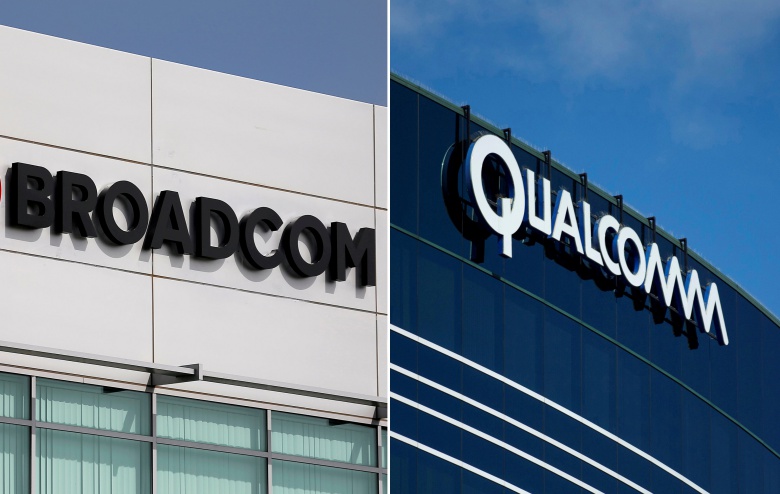Broadcom blocked
March 7, 2018 | Expert Insights

The Committee on Foreign Investment in the United States has announced that it will be conducting a review on Broadcom’s takeover of American telecommunications equipment company Qualcomm. Broadcom is currently based in Singapore. CFIUS stated that the hostile takeover may result in security concerns for the US by hindering the development of 5G technology.
Background
Qualcomm is an American semiconductor and telecommunications equipment company established in 1985. Based in San Diego, it is known for its investment in research and development. The company gains a significant portion of its profits from patent licensing and chip-making. Qualcomm played an important role in the development of CDMA and mobile technology through the 1990s. The company played an important role in the creation of the air interfaces used for 2G and 3G in the United States.
Qualcomm holds contracts with the United States Department of Defence, both classified and unclassified. The latter covers topics such as 5G and the Internet of Things.
Broadcom, formerly Avago Technologies, was established in 1961. The company is based in Singapore and deals in wired infrastructure and wireless communications.
The current US administration has blocked a number of Chinese companies from operating in US markets. Earlier this year, CFIUS stopped the $1.2 billion sale of money-transfer service Moneygram to Ant Financial, an affiliate of Chinese e-commerce giant Alibaba. The US President was reportedly directly involved in the blocking of the sale of Lattice Semiconductor to a Chinese company called Canyon Bridge Capital Partners.
Huawei is a Chinese telecommunications giant popular in markets across Asia, South America, and the Middle East. The company had to cancel a deal with AT&T due to security concerns in January. In the February hearing of the Senate Intelligence Committee, FBI Director Christopher Wray said, "We're deeply concerned about the risks of allowing any company or entity that is beholden to foreign governments that don't share our values to gain positions of power inside our telecommunications networks”.
In January, media released reports of a memo recommending that the US Government take over the work of deploying a 5G network. “Data is the oil of the 21st century and China has built the world’s largest reserve,” it read. “Building a nationwide secure 5G network sets the condition for future success in the information domain. Not building the network puts us at a permanent disadvantage to China in the information domain.”
Analysis
On Tuesday, the Committee on Foreign Investment in the United States (CFIUS) released a letter announcing the review of Broadcom’s bid to take over Qualcomm, which it deemed a possible “risk to the national security of the United States”. CFIUS called for a full investigation into the deal, and ordered Qualcomm shareholders to delay a vote scheduled for Tuesday. This vote could have enabled a Broadcom takeover.
“CFIUS has identified potential national security concerns that warrant a full investigation of the proposed transaction,” a letter reviewing the case read. CFIUS stated that Qualcomm held a position of trust in the US. Its dominant role in American telecommunications infrastructure “provides significant confidence in the integrity of such infrastructure as it is related to national security.”
CFIUS expressed its belief that the takeover would result in a re-direction of Qualcomm funds to immediate profits rather than R&D. Broadcom has spent six times more on acquisition than on R&D in the past decade, the letter pointed out. Broadcom CEO Hock Tan has expressed his belief that Qualcomm requires restructuring; Broadcom’s intention to turn Qualcomm towards private equity is a cause for concern. If the deal does go through, it will be financed by over $100 billion of debt, which analysts say will build pressure to increase profits.
According to CFIUS, Broadcom’s interference could leave a “void” that would be filled by Chinese counterparts such as Huawei. “Given well-known U.S. national security concerns about Huawei and other Chinese telecommunications companies, a shift to Chinese dominance in 5G would have substantial national security consequences for the United States,” the letter read.
Broadcom has proposed a bid of $117 billion to acquire Qualcomm. Qualcomm shares fell by 3% following the publication of CFIUS’ letter, due to concern that the deal would fall through.
CFIUS stated that their review would assess “the likelihood that acquisition of Qualcomm by Broadcom could result in a weakening of Qualcomm’s position in maintaining its long-term technological competitiveness.”
“The letter is reflective of a fundamental shift within the defence department and the Trump administration related to supply-chain assurance, technology transfer to the Chinese and reliance on Chinese customers,” a source in CFIUS told Financial Times. “Needless to say, this is not good for the deal.”
Broadcom stated its commitment to cooperate with CFIUS. “There can be no question that an American Broadcom-Qualcomm combination will provide far more resources for investments and development to that end [developing 5G technology]. Entrusting this effort to a failing Qualcomm management… would not be in America’s long-term interests,” the company said in a statement on Tuesday.
Assessment
Our assessment is that the United States is growing increasingly wary of deals linking US businesses to foreign entities, particularly Chinese entities. Washington is increasing scrutiny and tightening security. Additionally, it appears that the current administration has made the development of 5G technology a national priority. In light of the recent steel tariffs, analysts have also pointed out that the phrase “national security” is being used as a tool to modify business and trade policy.








Comments